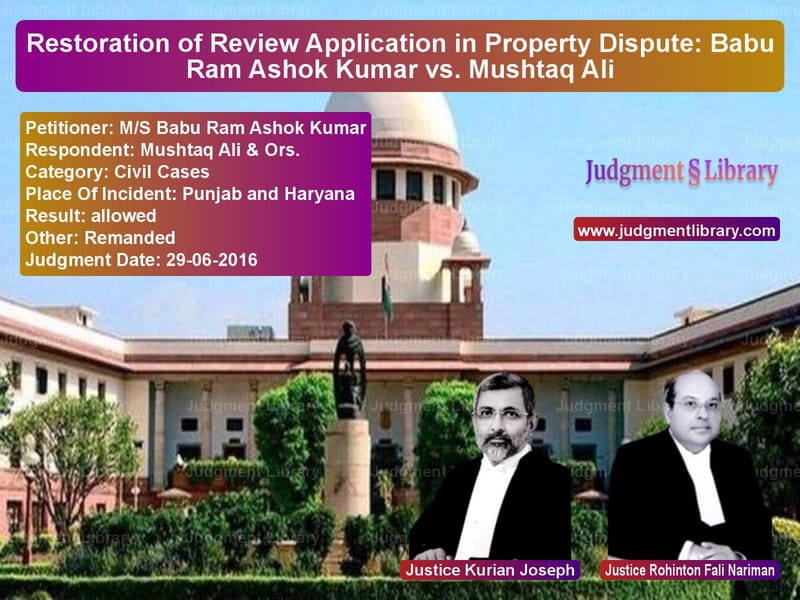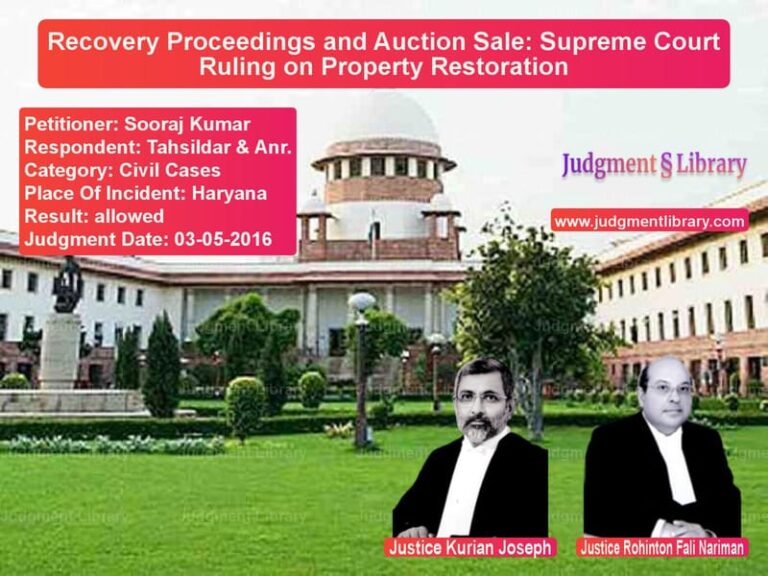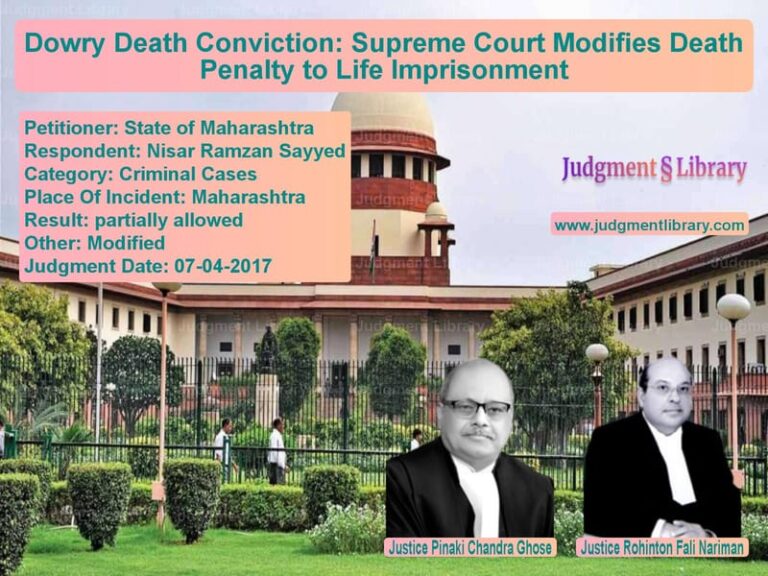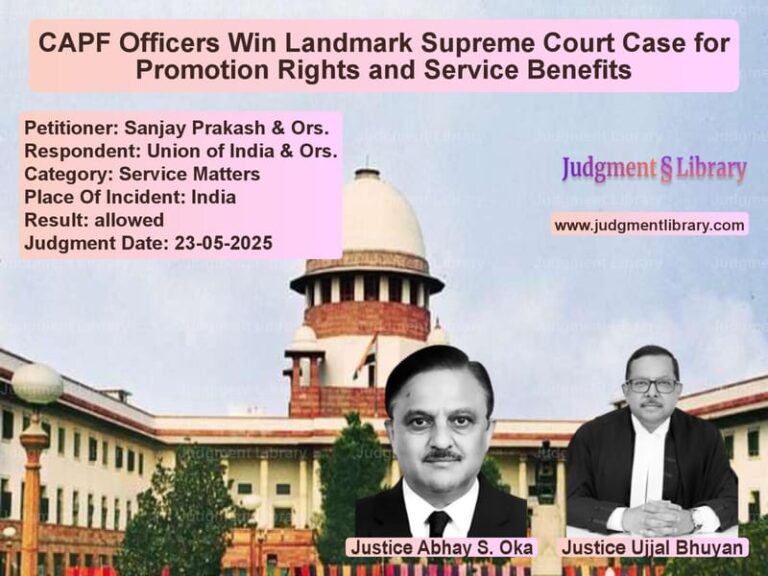Restoration of Review Application in Property Dispute: Babu Ram Ashok Kumar vs. Mushtaq Ali
The case of Babu Ram Ashok Kumar vs. Mushtaq Ali & Ors. pertains to a review application in a long-standing property dispute. The Supreme Court of India ruled in favor of restoring the review petition, directing the High Court to reconsider the case on its merits.
The judgment highlights the principles of procedural fairness and the importance of ensuring that litigants are given a fair opportunity to present their case before a court of law.
Background of the Case
The case originated from a second appeal (RSA No. 287 of 1986) filed in the Punjab and Haryana High Court concerning a property dispute. The High Court delivered its judgment on November 28, 2013. Dissatisfied with the ruling, the appellant, M/S Babu Ram Ashok Kumar, sought a review of the judgment.
However, the review application was dismissed on procedural grounds. The appellant then filed an application for restoration of the review petition, which was also dismissed by the High Court on September 4, 2014, citing lack of diligence in prosecuting the case.
Key Legal Issues
- Whether the appellant was denied an opportunity to argue the review petition on its merits.
- Whether the procedural dismissal of the restoration application was justified.
- Whether the Supreme Court should interfere and restore the review application for fresh consideration.
Arguments by the Parties
Appellant’s (Babu Ram Ashok Kumar) Arguments
- The review application was filed within the prescribed time limit.
- The High Court did not provide a fair opportunity to argue the review petition on its merits.
- The procedural dismissal was unjustified as the appellant was willing and prepared to argue the review petition.
- The review application should be restored to ensure that substantive justice is done.
Respondent’s (Mushtaq Ali & Ors.) Arguments
- The appellant did not diligently prosecute the case.
- The High Court had the discretion to dismiss the restoration application if the appellant failed to appear or pursue the matter.
- There was no substantial ground for restoring the review application.
- The case had been litigated for decades, and reopening the matter would cause unnecessary delay.
Supreme Court’s Judgment
The Supreme Court ruled in favor of the appellant, restoring the review application and directing the High Court to consider it on its merits.
“Having gone through the application and having heard the learned counsel for the parties, we are of the view that the review application deserves to be considered on merits.”
Key Observations by the Court
- The review application was filed within the prescribed time, and its dismissal was based solely on procedural grounds.
- The appellant should not be deprived of an opportunity to have the review application considered on its merits.
- The High Court erred in dismissing the restoration application without considering the substantive grounds for review.
- Litigants must be given a fair opportunity to present their case, especially when the review petition was filed in accordance with legal provisions.
Final Judgment
The Supreme Court ruled:
- The order dated September 4, 2014, dismissing the restoration application, was set aside.
- The review application was restored to its original file.
- The case was remitted to the Punjab and Haryana High Court for consideration of the review application on its merits.
- Both parties were directed to appear before the High Court on August 1, 2016.
- If the appellant failed to appear on the specified date, the review application would stand dismissed.
- The status quo order passed by the Supreme Court on January 6, 2015, regarding possession, would continue until the High Court disposed of the review application.
Conclusion and Legal Impact
This ruling reinforces several key legal principles:
- Procedural dismissals should not prevent substantive justice; courts must ensure that cases are decided on their merits.
- Review applications must be heard if filed within the prescribed time and procedural lapses should not deprive a party of legal recourse.
- The High Court must exercise its discretion fairly and allow a review petition to be considered when justified.
- Litigants must diligently prosecute their cases, but minor lapses should not lead to the complete foreclosure of their legal rights.
The Supreme Court’s decision safeguards the right to seek review and ensures that parties are not deprived of legal remedies due to technicalities.
Judgment delivered by: Kurian Joseph, Rohinton Fali Nariman
Judgment Date: June 29, 2016
The ruling sets an important precedent for procedural fairness in review applications and emphasizes the necessity of considering cases on their substantive merits rather than dismissing them on technical grounds.
Don’t miss out on the full details! Download the complete judgment in PDF format below and gain valuable insights instantly!
Download Judgment: MS Babu Ram Ashok K vs Mushtaq Ali & Ors. Supreme Court of India Judgment Dated 29-06-2016-1741872468496.pdf
Direct Downlaod Judgment: Direct downlaod this Judgment
See all petitions in Property Disputes
See all petitions in Specific Performance
See all petitions in Contract Disputes
See all petitions in Judgment by Kurian Joseph
See all petitions in Judgment by Rohinton Fali Nariman
See all petitions in allowed
See all petitions in Remanded
See all petitions in supreme court of India judgments June 2016
See all petitions in 2016 judgments
See all posts in Civil Cases Category
See all allowed petitions in Civil Cases Category
See all Dismissed petitions in Civil Cases Category
See all partially allowed petitions in Civil Cases Category







